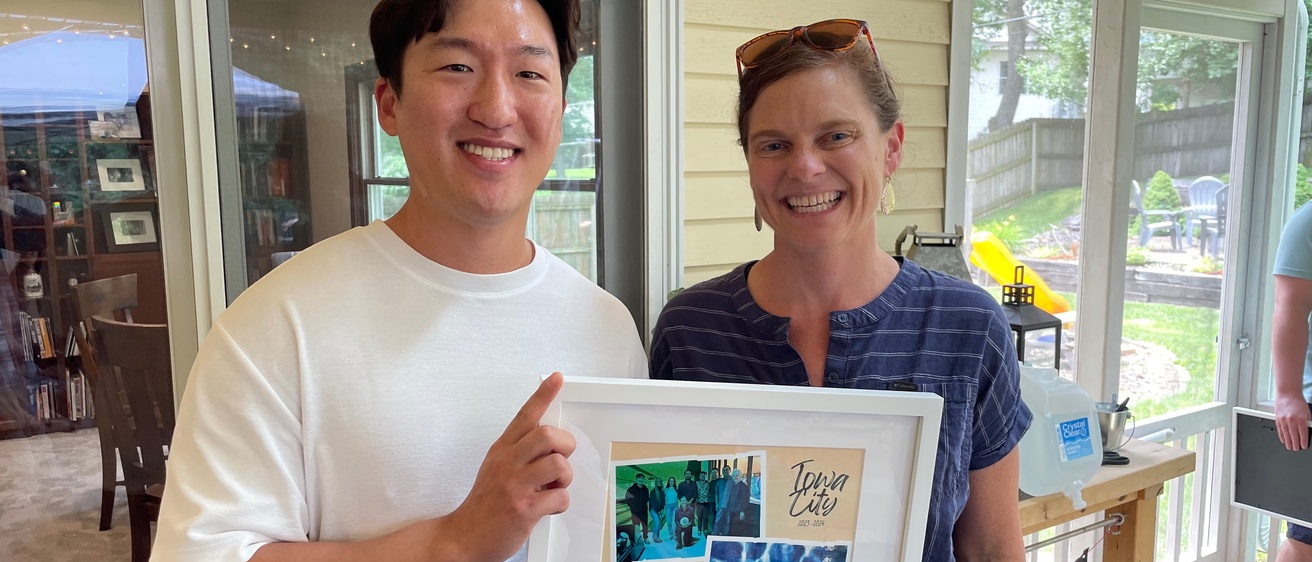Dr. Myungjin Jung, known as “MJ” to colleagues at the University of Iowa Health, Brain & Cognition Lab where he served as a post-doctoral research scholar for the past year, has accepted a position as a tenure-track assistant professor in the Department of Kinesiology, Health Promotion and Recreation at the University of North Texas (UNT) in Denton.
The appointment, says MJ, fulfills two important personal goals: 1. The opportunity to set up his own lab to continue his studies on the effects of acute and chronic exercise on cognitive function and to mentor master’s and doctoral students interested in studying the relationship between exercise and cognitive function; and 2. To reunite with his wife, Jihye Hoe, who lives and works in the Dallas-Fort Worth area.
HBC Lab Director Michelle Voss expresses appreciation and good wishes as MJ continues his career journey. “Even in just a short time MJ has made such an impact on the lab,” she says. “It was kind of a training run for his faculty job. He helped set up our lab for the BOOST study, he wrote a grant, he’s been an active mentor, and he has been brainstorming ideas and writing fiercely. He’s ready and we're so excited for him.”
A native of South Korea, Myungjin earned his Bachelor of Science and Master of Science in Physical Education, with an emphasis on Sport Psychology, from Seoul National University. He received his PhD in Health and Kinesiology in 2023 from the University of Mississippi where research with Dr. Paul Loprinzi and Dr. Minsoo Kang – experts in exercise and memory, and measurement evaluation, respectively – led to his postdoctoral position in Iowa.
“Specifically, Dr. Loprinzi focuses on evaluating the behavior effects of acute exercise on various types of memory function and exploring the mechanisms through which exercise influences memory. This overlaps with what we do in Michelle’s lab, which is why I came here. Dr. Loprinzi and Dr. Voss have worked together on some publications,” MJ says.
Dr. Jung has a particular interest in how exercise impacts executive function and episodic memory. Executive function is a subset of cognitive skills, including the ability to hold and manipulate information over short periods, shift attention to relevant and important information while ignoring irrelevant details, and respond correctly to stimuli while inhibiting responses not related to the stimuli. Episodic memory refers to the ability to recall past personal events or information, such as where and with whom you had dinner last Saturday.
At UNT, he will continue what he has been doing thus far using an innovative methodological approach, known as time varying effect modeling (TVEM). He uses the TVEM approach to determine how the effects of exercise on cognition vary at each continuous increment of age. “TVEM allows us to identify the specific age range within similar age groups where the benefits of exercise are particularly pronounced,” he says.
TVEM was one of many interests during his busy and productive time at UI. He led-authored, in collaboration with other HBC members, a journal article using TVEM. This research focuses on examining how the associations between changes in cognition and brain network functional connectivity, induced by a 6-month aerobic exercise intervention, vary in efficacy with age among older adults. This article is nearly ready for submission. He also co-authored a separate journal article on HBC Lab’s Brain EXTEND project that is currently under second-round review after addressing the reviewers’ comments.
His work at the HBC Lab has also included collaboration with Hayley Chappell, a post-baccalaureate exercise specialist, on pilot sub-maximal testing for the BOOST project, which is just getting underway. Another project involved submitting a grant proposal to the American College of Sports Medicine (ACSM). The proposed study aimed to determine whether salivary alpha-amylase acts as a mediator for changes in performance in executive function and episodic memory during and after high-intensity acute exercise. Although the proposal was not approved, MJ remains undeterred. He emphasizes that the experience of writing grant proposals is “crucial for a scientist” and believes it will significantly enhance his efforts to secure research grant funding for his lab at UNT in the future.
What will he miss about Iowa City? “Everything,” says MJ. “Michelle, the lab members, and our collaborative lab space. Big Grove Easy Eddy, my favorite beer, will be hard to replace. And despite its challenges, I will even miss the snow.”
More seriously, he adds: “I think Michelle is one of the foremost scholars in the field of cognitive neuroscience, and one of the best mentors I have ever worked with. I was also deeply impressed by the dedication and hard work of the lab members. Their commitments, innovation, and passion for research provided me with strong motivation to work hard.”
